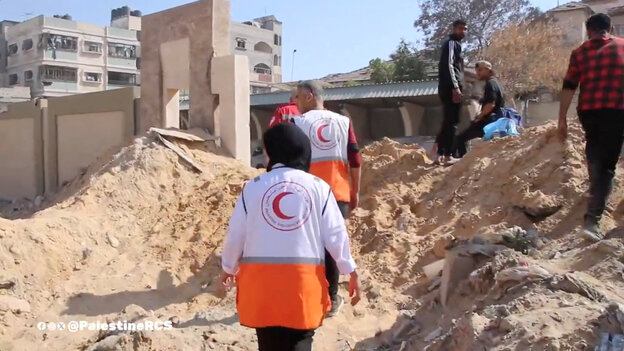France, Egypt and Jordan call for an immediate ceasefire. Apparently there is already a date for a ground offensive in Rafah.

Palestinian Red Cross employees inspect Khan Yunis after the withdrawal of the Israeli army Photo: Reuters
GAZA STRIP/JERUSALEM afp/taz | In negotiations for a ceasefire in the Gaza Strip, the radical Islamic group Hamas says it is examining a three-stage mediation proposal. Although Israel did not respond to any of the demands during the talks, “the movement's leadership is examining the proposal presented,” the Palestinian Islamist organization said on Tuesday. As a first step, the proposal calls for a six-week ceasefire, Hamas sources say. Meanwhile, France, Egypt and Jordan called for an “immediate” ceasefire in the war.
Under the proposal, the ceasefire would allow for an exchange of Israeli hostages and Palestinian prisoners. Consequently, a total of 42 people kidnapped in the Gaza Strip will be released. In exchange, Israel should release up to 900 imprisoned Palestinians, about 100 of whom are serving long or life sentences.
The first phase of the proposal also calls for the return of displaced Palestinian civilians to the northern Gaza Strip and 400 to 500 trucks transporting aid supplies to the Palestinian territory every day, according to a person familiar with the negotiations.
In the second phase, all Israeli hostages will be released, including soldiers and officers, in exchange for a number of Palestinian refugees, which has yet to be determined. At this point, Israeli military checkpoints should also be removed, the Hamas source explained. A third part of the agreement includes a permanent ceasefire and a complete Israeli withdrawal from the Gaza Strip.
More debate on ground offensive in Rafah
Since the weekend, Israel and Hamas have been negotiating again in Cairo, mediated by the United States, Egypt and Qatar, an agreement for the release of hostages and a ceasefire in the Gaza Strip. According to American information, Hamas “made a proposal at the end of the weekend.” “It is now up to Hamas to implement this proposal,” National Security Council spokesman John Kirby said in Washington. He did not provide any details about the proposal.
At the same time, discussions continued about an imminent Israeli offensive on the city of Rafah in the southern Gaza Strip. The United States spoke out once again against such an offensive. Given the 1.5 million Palestinians who have fled to Rafah, the United States “has made clear to Israel that we believe that a major military invasion of Rafah would have an immensely damaging impact on these civilians and would ultimately harm Israel's security.” “said the US State Department. spokesperson Matthew Miller.
Israeli Prime Minister Benjamin Netanyahu had previously confirmed the upcoming offensive and said a date had already been set. Victory over the radical Islamic Hamas requires “the invasion of Rafah and the elimination of the terrorist battalions there,” Netanyahu said. “It will happen, there is a date.”
According to Israel, the city bordering Egypt is the last remaining Hamas stronghold in Palestinian territory. Despite international criticism, Israel is sticking to its offensive plans. Israel's Western allies, including the United States and Germany, had spoken out against an offensive on Rafah.
Calls for a ceasefire are getting louder
Meanwhile, France, Egypt and Jordan called for an “immediate” ceasefire in the war in Gaza. “The war in Gaza and the catastrophic human suffering associated with it must end immediately,” wrote French President Emmanuel Macron, his Egyptian counterpart Abdel Fattah al-Sisi and Jordanian King Abdullah II in an article for several newspapers.
“In view of the unbearable number of victims (…), we underline the urgent need for a permanent ceasefire in Gaza,” they wrote. The heads of state called for a call from the UN Security Council for a ceasefire to be implemented “in full and without further delay”, as well as the release of hostages held by Hamas.
Macron, al-Sisi and Abdullah II also warned of the “dangerous consequences of an Israeli offensive in Rafah.” “Such an offensive would only increase the loss of life and suffering, exacerbate the risk and consequences of mass forced displacement of Gaza's population, and lead to a threat of escalation in the region.”
Hamas sparked the war on October 7 with its unprecedented attack on Israel. Fighters from Hamas, which the EU and the United States classify as a terrorist organization, and other Palestinian militant groups invaded Israeli cities and carried out massacres of civilians. According to Israeli information, they killed around 1,170 people and kidnapped around 250 as hostages in the Gaza Strip.
In response to the attack, Israel launched a massive military operation in the Gaza Strip. According to the latest Hamas figures, which cannot be independently verified, more than 33,200 people were killed.